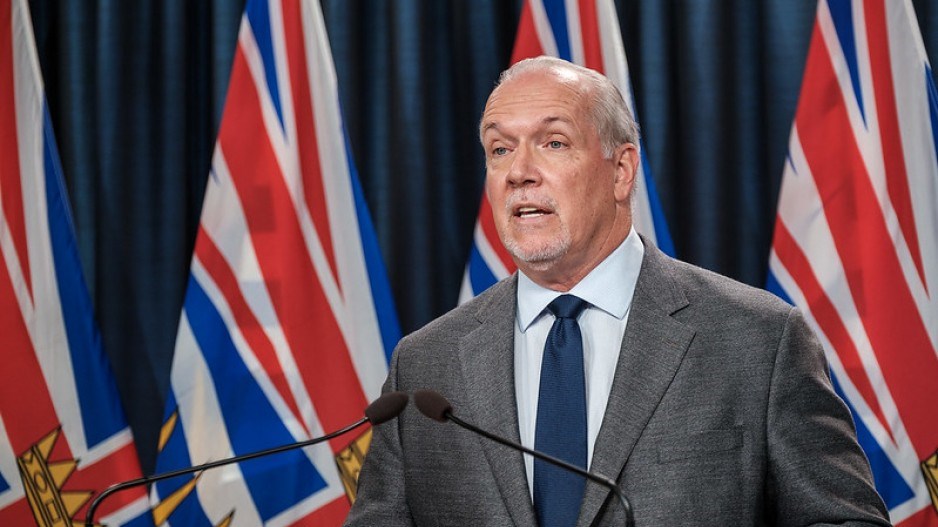The next provincial election in British Columbia is tentatively scheduled for October 2024. For the past 16 months, the BC New Democratic Party (NDP) has not faced a full-time leader of the official Opposition – in the legislative assembly or outside of it.
The situation changed earlier this month with the election of Kevin Falcon as leader of the BC Liberals. The opportunity for Falcon to sit across the floor from Premier John Horgan is still weeks or months away, depending on how quickly a byelection can be called and organized.
Research Co. and Glacier Media had a chance to gauge the perceptions of British Columbians on the new provincial political landscape, and the results outline major challenges for the province’s four functional political parties.
The BC NDP can look into the current situation with a sense of calm. Practically seven in 10 British Columbians (69%) approve of the way Premier John Horgan has been handling his duties. This represents a seven-point increase since our final election poll in October 2020, as the New Democrats were headed for a massive victory that ultimately materialized as predicted.
The issue that is truly striking is how well Horgan currently connects with people who did not support his candidates in 2020. Majorities of British Columbians who voted for the BC Green Party (61%) and the BC Liberals (56%) approve of his performance as head of government. Last month, the satisfaction rating for the provincial government on COVID-19 fell to its lowest level (60%). Horgan is now outperforming this indicator, which was so closely tied to the BC NDP’s electoral success in 2020.
In 2020, the BC NDP garnered 48% of the vote – the highest level of support experienced by any provincial party since the BC Liberals in 2001. At this stage, 46% of decided voters would cast a ballot for the BC NDP. While support for the New Democrats is strong on most demographics, there is a significant edge among voters aged 35 to 54 (48%, with the BC Liberals at 35%).
The BC Liberals find themselves in second place at the start of the Falcon era. Across the province, 38% of British Columbians approve of his performance as leader, while 33% disapprove and 29% are undecided. Falcon’s approval rating finds a welcoming public among the province’s oldest voters, with 47% of people aged 55 and over saying they like what they have seen so far.
In previous elections, the BC Liberals benefited from a high level of support from voters aged 55 and over. The race, if an election took place tomorrow, would be close among the province’s oldest electors, with the BC NDP holding a four-point advantage over the Falcon-led BC Liberals (46% to 42%). The race is equally tight in Metro Vancouver, where Falcon’s Surrey roots may end up making many races competitive in 2024.
The BC Green Party can count on the backing of 13% of decided voters, with their support – as has been traditionally the case – tapering off as people age: 17% among those aged 18 to 34, 13% among those aged 35 to 54 and 9% among those aged 55 and over. Leader Sonia Furstenau’s approval rating stands at 36%, down 10 points since October 2020, when her performance in the televised debate was collectively lauded.
The BC Conservatives keep the same level of support they had in the last election (2%) and leader Trevor Bolin maintains a paltry approval rating (19%). The possibility of a BC Liberal rebrand makes the future of the BC Conservatives especially complex. A new name for a centre-right party may ultimately bring back some of the voters who flocked to other options at the supposedly federal Liberal nature of the (currently called) BC Liberals.
The issue landscape has returned to its pre-COVID status. Across the province, the most important concern is housing, poverty and homelessness with 33% (up 10 points since October 2020), followed by health care with 23% (unchanged), the economy and jobs with 16% (down nine points), the environment with 10% (up three points) and COVID-19 with 6% (down seven points).
The way these numbers will fluctuate in the next two and a half years will depend, in large part, to the age of the electorate. Voters aged 18 to 34 are desperately worried about housing. The BC NDP will seek to capitalize on Falcon’s tenure as a developer and run a campaign similar to the one the BC Liberals orchestrated against the Carole James-led BC NDP in 2005 and 2009: it is too soon to go back to the previous party. However, these strategies – as the BC Liberals found out in 2017 – have an expiry date.
Voters aged 35 to 54 appear to be happy with the status quo. While 71% of them approve of Horgan, only 35% think Falcon has done a good job so far. This is a group that will react positively to advancements on matters such as child care and education.
Voters aged 55 and over are primarily concerned with health care and are not particularly displeased with Falcon as the new leader of the BC Liberals. In Nova Scotia, we recently saw a carefully constructed campaign by the centre-right opposition take the issue of health care away from a popular incumbent government. The BC Liberals will look to promise enhanced investments in order to rekindle with voters.
Mario Canseco is president of Research Co.
Results are based on an online study conducted from February 12 to February 14, 2022, among 800 adults in British Columbia. The data has been statistically weighted according to Canadian census figures for age, gender and region. The margin of error, which measures sample variability, is plus or minus 3.5 percentage points, 19 times out of 20.




